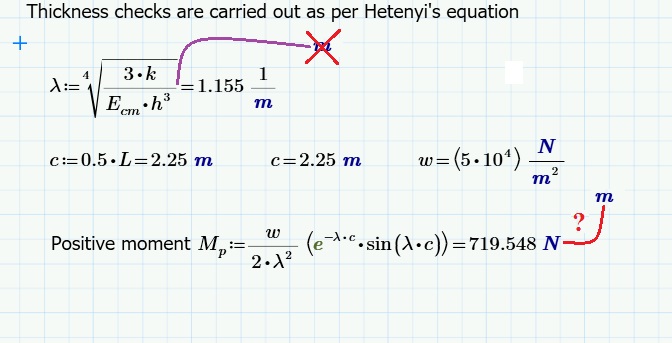Community Tip - If community subscription notifications are filling up your inbox you can set up a daily digest and get all your notifications in a single email. X
- Subscribe to RSS Feed
- Mark Topic as New
- Mark Topic as Read
- Float this Topic for Current User
- Bookmark
- Subscribe
- Mute
- Printer Friendly Page
Issue with calc
- Mark as New
- Bookmark
- Subscribe
- Mute
- Subscribe to RSS Feed
- Permalink
- Notify Moderator
Issue with calc
Hi
I have attached an mcdx file. I don't understand what the issue is when lambda*c is raised to the power of e. Please let me know a work around for this problem.
Sriprakash
- Labels:
-
Other
- Mark as New
- Bookmark
- Subscribe
- Mute
- Subscribe to RSS Feed
- Permalink
- Notify Moderator
Hi,
you have to check the formula, t may be that is missing even a term.

- Mark as New
- Bookmark
- Subscribe
- Mute
- Subscribe to RSS Feed
- Permalink
- Notify Moderator
F.M.
There is no term missing. I see that you have changed lambda to the power of 3 instead of 2. However, even then I don't get a result. There is something wrong. Kindly help. The problem seems to be with e to the power of lambda X c.
Sriprakash
- Mark as New
- Bookmark
- Subscribe
- Mute
- Subscribe to RSS Feed
- Permalink
- Notify Moderator
Hi S. S.,
You have, however, multiplied lambda for the unit meter, which is incorrect.
Correcting results:

Greetings
F.M.
- Mark as New
- Bookmark
- Subscribe
- Mute
- Subscribe to RSS Feed
- Permalink
- Notify Moderator
Hi F.M
LAmbda is a factor without units. However the program insists on giving it a unit of 1/m. So I multiplied the units by m to ensure that the result is without units. Anyway, the problem at hand seems to be to find a way out to compute e raised to lambda x c. Kindly let me know if there is a solution. Do you feel this is due to the units of lambda itself.
Sriprakash
- Mark as New
- Bookmark
- Subscribe
- Mute
- Subscribe to RSS Feed
- Permalink
- Notify Moderator
if lambda must be dimensionless, then c must also be such!
there is something else to be corrected:

- Mark as New
- Bookmark
- Subscribe
- Mute
- Subscribe to RSS Feed
- Permalink
- Notify Moderator
It's not "the program insists on giving it a unit of 1/m". That is YOUR doing.
YOU gave units to k, h and Ecm. With the formula provided for lambda, (without you multiplying it with m) the unit of 1/m comes out.
And, as FM states, lambda MUST have the unit 1/m or else c cannot have unit m. Note that you are using lambda time c as the argument to the sin as well as the exp functions. In both those functions the argument cannot have a unit; so the units of lambda and c must cancel out.
Luc
- Mark as New
- Bookmark
- Subscribe
- Mute
- Subscribe to RSS Feed
- Permalink
- Notify Moderator
Luc
Many thanks for throwing light on the problem.
Sriprakash





